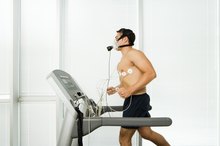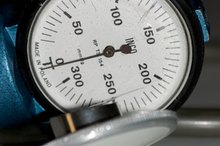What does fact checked mean?
At Healthfully, we strive to deliver objective content that is accurate and up-to-date. Our team periodically reviews articles in order to ensure content quality. The sources cited below consist of evidence from peer-reviewed journals, prominent medical organizations, academic associations, and government data.
- American Heart Association: Target Heart Rates
- American Council on Exercise: Monitoring Exercise Intensity Using Heart Rate
The information contained on this site is for informational purposes only, and should not be used as a substitute for the advice of a professional health care provider. Please check with the appropriate physician regarding health questions and concerns. Although we strive to deliver accurate and up-to-date information, no guarantee to that effect is made.
The Teenage Maximum Heart Rate
During teenage years, the body undergoes numerous changes that make it difficult to test cardiovascular fitness for teens. Knowing the maximum heart rate will assist in determining safe target heart rate zones and help to assess fitness levels. You can develop safe fitness programming for teens using a simple formula that establishes upper limits.
Definition
Maximum heart rate is referred to as the highest number of times a heart beats in one minute. Maximum heart rates for healthy teenagers range from 201 to 207 beats per minute, according to the American Heart Association 1. Maximum heart rate levels drop about 10 beats per minute every decade in a person's life.
Calculate Maximum Heart Rate
How to Calculate a Fair Weight Loss Competition
Learn More
Determine maximum heart rate by subtracting your age from the number 220, explains the American Council on Exercise explains 2. This formula is strictly based on age; factors such as history of smoking can negatively affect heart rates.
Measure Heart Rate
The American Council on Exercise explains "the radial pulse at the base of the thumb and the carotid pulse at the side of the neck are used to determine heart rate." By placing the first two fingers of one hand on either site, heart rates can be easily determined 12. Establishing heart rates in beats per minute is done by multiplying the number of beats per 10 seconds by six.
FactorsThat Effect Maximum Heart Rate
Active Heart Rate for Teens
Learn More
The 220 - age = maximum heart rate formula is simply an estimate. Inactive individuals and those who smoke can potentially have a negative impact on accuracy of this formula. Limits should be discussed with a physician before exercise. Taking health history into account, physicians can best prescribe a safe exercise regimen within reasonable levels.
- The 220 - age = maximum heart rate formula is simply an estimate.
- Taking health history into account, physicians can best prescribe a safe exercise regimen within reasonable levels.
Determine Target HR from Maximum Levels
According to the American Council on Exercise, "working ranges are from 50 to 80 percent of your maximal heart rate." For example, if maximal heart rate is 180 beats per minute, the low end of the range or 50 percent of max, would be 90 beats per minute, and the high end of the range or 80 percent of max would be 144 beats per minute 2.
Related Articles
References
- American Heart Association: Target Heart Rates
- American Council on Exercise: Monitoring Exercise Intensity Using Heart Rate
- New York Times, "'Maximum' Heart Rate Theory Is Challenged." April 24, 2001.
- Larson ED, St Clair JR, Sumner WA, Bannister RA, Proenza C. Depressed pacemaker activity of sinoatrial node myocytes contributes to the age-dependent decline in maximum heart rate. Proc Natl Acad Sci USA. 2013;110(44):18011-6. doi:10.1073/pnas.1308477110
- Gellish RL, Goslin BR, Olson RE, McDonald A, Russi GD, Moudgil VK. Longitudinal modeling of the relationship between age and maximal heart rate. Med Sci Sports Exerc. 2007;39(5):822-9. doi:10.1097/mss.0b013e31803349c6
- Jackson, Andrew S. Estimating maximum heart rate from age: Is it a linear relationship?. Med Sci Sports Exerc. 2007;39(5):821. doi:10.1249/mss.0b013e318054d3ca
Writer Bio
Craig Smith covers weight loss and exercise programming for various online publications. He has been a personal trainer certified through the American Council on Exercise since 2001. Smith also holds a diploma in exercise physiology and kinesiology from the National Personal Training Institute.









